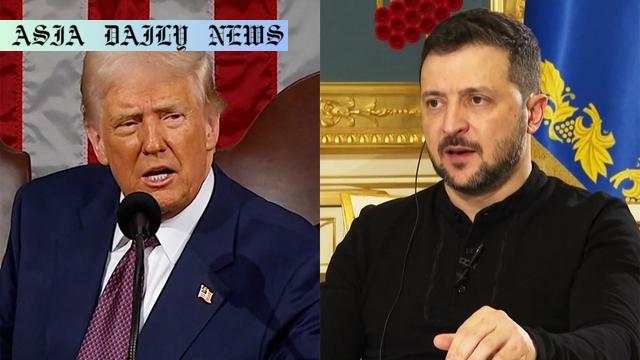mineral rights: Zelenskyy reveals US proposal granting access to Ukraine’s minerals, sparking scrutiny of legal and fairness aspects.
US proposed a new mineral rights deal to Ukraine.
Zelenskyy shows concern over aspects of the proposal.
The deal suggests US gaining access to Ukraine’s resources.
Financial Times reports on backlash against the proposal.
Ukrainian officials call the draft ‘unfair’ and unlikely to be signed.

US Proposes New Deal for Ukrainian Mineral Rights
The United States has recently proposed a controversial new mineral rights deal to Ukraine, a move that has drawn significant attention and remarks from various quarters. Ukrainian President Volodymyr Zelenskyy confirmed on Friday that this new draft is markedly different from the prior agreement discussed with former US President Donald Trump. Unlike the framework that failed to materialize last month, the current proposal is laden with additional terms that had not been part of earlier talks. Some of these provisions had already faced rejection from involved parties, raising questions about the motivations behind this revised pitch.
Legal Examination Amid Scrutiny of Proposal’s Fairness
Zelenskyy emphasized the importance of a thorough legal review of the proposed agreement before making any decisions. According to him, Ukraine intends to analyze the terms with the assistance of legal experts rather than outright reject the draft. This cautious approach underscores the sensitivity of the issue and the potential implications for Ukraine’s sovereignty and control over its natural resources. Financial Times has reported speculative elements from the draft, describing it as an “escalation” in efforts by the US to gain influence and control over one of Ukraine’s most valuable assets—its mineral resources.
Diverging Perspectives on the Deal’s Impact
While US President Donald Trump expressed optimism that a mineral rights agreement could be signed soon, skepticism from Ukrainian officials hints at potential roadblocks. Reportedly, at least three Ukrainian government representatives have criticized the proposal, with one labeling the draft terms as “unfair.” The disagreement highlights underlying tensions and differing expectations between the two nations. Such concerns are not trivial, as Ukraine seeks to balance diplomatic relations while safeguarding its national interests. If signed in its current form, the agreement could reshape resource management dynamics in Ukraine and influence geopolitics in the region.
Economic and Strategic Implications
The implications of the proposal extend beyond legalities and fairness. The strategic importance of Ukraine’s mineral wealth has long attracted international attention. From rare earth elements to essential minerals for high-tech industries, Ukraine’s resources could play a vital role in global supply chains. The possibility of any foreign nation, including the United States, gaining significant sway over these resources raises broader economic and geopolitical concerns. For Ukraine, deciding on the deal could involve weighing immediate economic benefits against long-term sovereignty and independence in managing its assets. Such a decision is magnified in importance given the ongoing conflict and need for rebuilding across Ukraine.
What Lies Ahead
The road ahead remains uncertain. With negotiations and legal reviews in progress, the outcome of this mineral rights agreement will likely depend on Ukraine’s ability to navigate the fine line between international cooperation and protecting its national interests. Public opinion, political pressures, and the nuanced geopolitics of US-Ukraine relations will all invariably shape the final course of action. As both nations look toward potential collaboration, the fairness, transparency, and mutual respect involved in these discussions will be under close scrutiny from the global community.



Commentary
The Ethical Dilemmas in Mineral Rights Proposals
The newly proposed US mineral rights deal with Ukraine raises an array of ethical concerns and dilemmas. At its core, decisions involving control over natural resources speak to sovereignty, transparency, and equity. While international partnerships can bring immense benefits, particularly for a nation recovering economically like Ukraine, it is equally vital to ensure these arrangements are negotiated fairly and serve the long-term interests of the beneficiary nation.
Balancing Cooperation and Sovereignty
Of particular interest here is how Ukraine can navigate its dire economic needs while protecting its long-term sovereignty. Post-conflict recovery often leaves nations vulnerable to unfavorable agreements, as immediate financial needs overshadow long-term planning. This proposal, as outlined by the Financial Times, appears to tilt heavily in favor of the US, potentially leaving Ukraine at a disadvantage. It is commendable that Zelenskyy has decided to involve legal experts to dissect the terms and ensure fairness, showcasing a level of prudence in handling the situation.
The Need for Transparent Negotiations
In scenarios involving negotiation between nations, transparency remains key to maintaining public trust and preserving mutual respect. Any perception of coercion or exploitation—intentional or otherwise—can tarnish relationships and create resentment. By allowing scrutiny of the mineral rights deal and engaging legal experts, Ukraine can demonstrate that it values transparency and balanced partnerships. This approach not only safeguards Ukraine’s interests but also enhances its credibility on the global stage.
A Historic Precedent for Mineral Rights Agreements
If handled well, the result of this agreement could serve as a precedent for future resource-based partnerships. It could show that even economically strained nations have agency in deciding the fate of their resources while pursuing growth opportunities. Conversely, a rushed or unfair agreement could set a worrying standard and undermine trust in future collaborations. Ukraine’s position in this case offers an important lesson to other nations potentially facing similar scenarios.
Ultimately, the outcome of this mineral rights deal will heavily depend on how each party prioritizes fairness, sustainability, and shared benefit. As observers, we can only hope that decisions are made with careful consideration for Ukraine’s welfare and the broader implications for the global community.